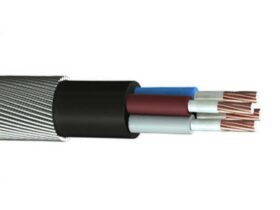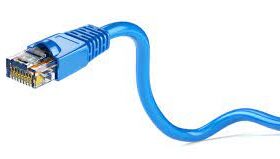Types of Cables you should know in the Telecommunication Industry: –
• Coaxial cable: – This cable includes one physical channel that carries the signal surrounded by another concentric physical channel. Both the channels of the coaxial cable run along the same axis. The outer channel of the cable serves as a ground. Many of these cables can be placed in a single outer sheathing and, with repeaters, can carry information for a great distance. This cable is used as a transmission line for radio frequency signals. Its applications include feedlines connecting radio transmitters and receivers with their antennas, distributing cable television signals and computer network (Internet) connections.
• Ethernet cable: – This cable used on wired networks. Ethernet cables used to connect devices on local area networks such as personal computers, routers, and switches.
• Fiber optic cable: –This cable consists of one or more optical fibers, each of which is able to transmit messages modulating onto light waves. Fiber optic cables are available in lots of different types, depending on the number of fibers and where and how they will be installed. Due to the increasing demands of higher broadband, these cables are widely used in many modern networks.
• A telephone line: – This is a single-user circuit on a telephone communication system. Telephone lines are generally used to deliver landline telephone service and digital subscriber line (DSL) internet service to the premise. These cables are connected to the public switched telephone network.
Advantages of telecommunication cables: –
• Bandwidth: –Telecommunication cables have much greater bandwidth than other cables. The amount of information that can be transmitted per unit time of these cables over other transmission media is its most significant advantage.
• Low Power Loss: –The telecommunication cables offer low power loss, which allows for longer transmission distances.
• Interference: –Telecommunication cables are immune to electromagnetic interference. These cables can also be run in electrically noisy environments.
• Size: – In comparison to other cables, telecommunication cables have much more capacity and a cross-sectional area is much less.
• Weight: – These cables are much thinner and lighter. That is why they also occupy less space. The lighter weight makes them easier to install.
• Security: – As telecommunication cables do not radiate electromagnetic energy, emissions cannot be intercepted.
• Flexibility: –The telecommunication cables have greater tensile strength. These cables are flexible, bends easily and can resist most corrosive elements
• Conductivity and heat resistant: –The telecommunication cables have high resistance to heat, eliminating most issues of overloading. They are also resistant to corrosion.
To meet the diverse requirements of the telecommunication industry, the telecommunication cable or telephone wire manufacturers in India are involved in presenting a superlative range of the product in the market. The offered cables are made available conveniently as per the client’s requirements and can be installed fast. You can also find optimum-grade communication industrial cables from them. In adherence to set industry standards, these offered cables are fabricated by the adroit professionals using quality approved raw material and contemporary technology. Our offered cables are highly acclaimed in the market due to their excellent electrical and physical properties.
To maintain a continuing level of quality on the production of these telecommunication cables, the manufacturers typically administer a Quality Management System (QMS) consistent with the latest issue of standards documents satisfactory to the purchaser.
For purchasing quality telecommunication cables, you need to rely on a dependable telecommunication cable manufacturer in the market.
Industrial automation products are changing in view of the demands for more security, fast transmission and connectivity. Working with innovation, Relemac Technologies Pvt. Ltd. continues to meet such demands with perfection by offering an advanced array of Industrial Cables and Wires. We design and manufacture a wide range for various industries and establishments across the globe.
We offer Thermocouple Cables, Coaxial Cable, Control Cable, Fiber Optical Cables, Fire Survival Cables / Resistant Cable, House Wiring/ Electrical Building Wire, LAN Networking Cables and PTFE Cables. In addition, we also provide PVC CABLES, Rubber Cables, Shielded Instrumentation Cables, Submersible Pump Cables, Telecommunication Cable and XLPE Cables in various specifications.











Leave a Reply